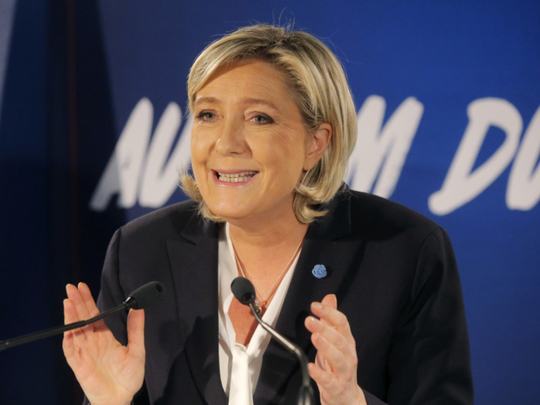
PARIS
They are the family at the centre of it all, the standard bearers of Europe’s right-wing populism and an anti-establishment establishment. The Le Pen dynasty has presided over France’s National Front from its inception, guiding the party from the fringes of political life to the centre stage. Their success has in turn spurred similar movements across the continent, the first in a populist upheaval that now spans from Hungary to Holland to Britain. Once unthinkable, a National Front victory is now a serious prospect in France’s 2017 presidential elections. Whether the party wins, the Le Pen family ideology will remain a new normal in a drastically altered political landscape.
The astonishing success of the National Front is inextricably tied to the evolution of the Le Pens from a family who preached outright xenophobia to a clan of savvy insiders who rely on loaded euphemisms and the latent anxieties of voters. But despite the family’s remarkable political advances, there is trouble in the ranks — a heated dispute among the generations of this most disruptive of dynasties over their future direction. On the eve of the most important election in their party’s history, how the family handles these tensions could make all the difference.
The story of the Le Pens begins with Jean-Marie Le Pen, the octogenarian patriarch and convicted Holocaust denier who cofounded the National Front in the early 1970s and gave it the reputation for racism and anti-Semitism. Then there is his estranged daughter, the outspoken Marine Le Pen, who dramatically severed all ties with her father to boost her chances to win the presidency next year. And finally, there is Marion Marchal-Le Pen, 26, whose hard-line social conservatism has put her at odds with her aunt’s campaign.
The two women exemplify the divisions in a party for which the doors of power, analysts say, have finally begun to crack open.
Projecting seriousness
Marine Le Pen, in the middle of her campaign, has sought to project an image of seriousness, competence and composure. Although she has been married and divorced twice, her private life is rarely a matter of tabloid speculation. A former lawyer, her words are always carefully measured. And while she has heralded the victory of Donald Trump in the US, she does not emulate his tactics: her Twitter account does not attack private citizens or scandalise the French foreign policy establishment in the same way.
To cleanse the party of her father’s legacy, Le Pen has also sought to present a new, more mainstream image of the National Front, despite maintaining its extreme anti-immigrant and anti-Europe bottom line. The French call this the “de-demonisation” of the party.
For scholar Nonna Mayer, an expert in the party’s history at Sciences Po in Paris, Le Pen’s aim has been “to make the party look nicer, a party ‘like the others’, presenting the National Front as the guardian of democracy against Islam, and defending the rights of men, gays, and Jews.”
To that end, Le Pen’s campaign materials have all conspicuously omitted her last name and the name of her party.
Furthermore, she has heavily used the colour blue throughout, a hue traditionally reserved for France’s Socialist Party. And now, according to polling data, the National Front enjoys the support of more working-class voters than any other political party in France.
By contrast, Marion Marchal-Le Pen often seems closer to her grandfather than her aunt. She is a young firebrand with a stronger commitment to the ideology of the old National Front. And if she cultivates the image of a Joan of Arc safeguarding a nation under siege, she has also become a French Bristol Palin, a headline staple who fascinates readers here with her shotgun wedding and, for a while, the mystery over her true father’s identity. In 2013, a French newspaper revealed that the culprit was Roger Auque, a war correspondent who died the following year. Marchal-Le Pen later sued for invasion of privacy.
Quick to judge
Her tone is often more severe than her aunt’s. In the wake of the Nice attack, for instance, she immediately gathered before her supporters and blamed “Islamism” — before there were any known links between the suspect and terrorist networks.
“You are with us and against Islamism, or you are against us and for Islamism,” she said. “Those who choose the status quo become complicit with our enemies.”
In this election year, the two younger Le Pens have increasingly butted heads over just how much of the status quo must be rejected.
Their latest feud erupted over the issue of abortion, which Marine Le Pen now tepidly supports, in marked contrast to her previous opposition.
In May, the leader of the National Front said that existing laws on abortion should not be “cast into question.” France legalised abortion in 1975, and the French health system has covered the full cost of abortions since 1982.
But last week, her niece, who, at 22, became the youngest member of Parliament in modern French history, declared the opposite, insisting that France should ban “the full and unlimited reimbursement of abortion.”
Then she went further, saying in an interview with a Catholic magazine that “full and unlimited abortion should be reversed, because women are responsible and should be treated as such.”
These remarks prompted a swift rejection from her aunt, who quickly assured voters that such a reversal “is not in my programme.”
In the end, Jean-Marie Le Pen had the last word. The 88-year-old, who once referred to the Nazi concentration camps as a “detail of history,” agreed with his granddaughter. “Abortion is legal,” he wrote on Twitter, “but the encouragement of abortion is criminal, in a country with a severe demographic deficit.”
In the 2017 election, Marine Le Pen will face challengers from other parties. But first, she must win this latest family feud.
—Washington Post












